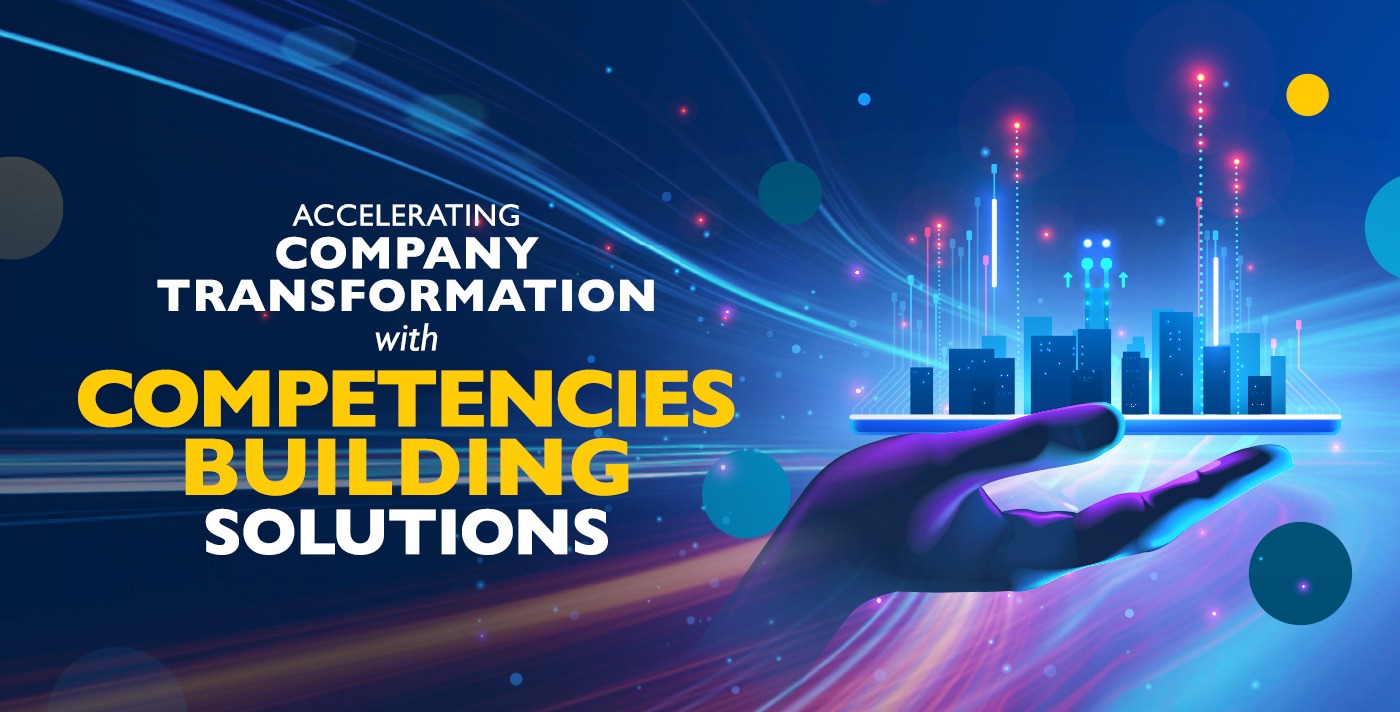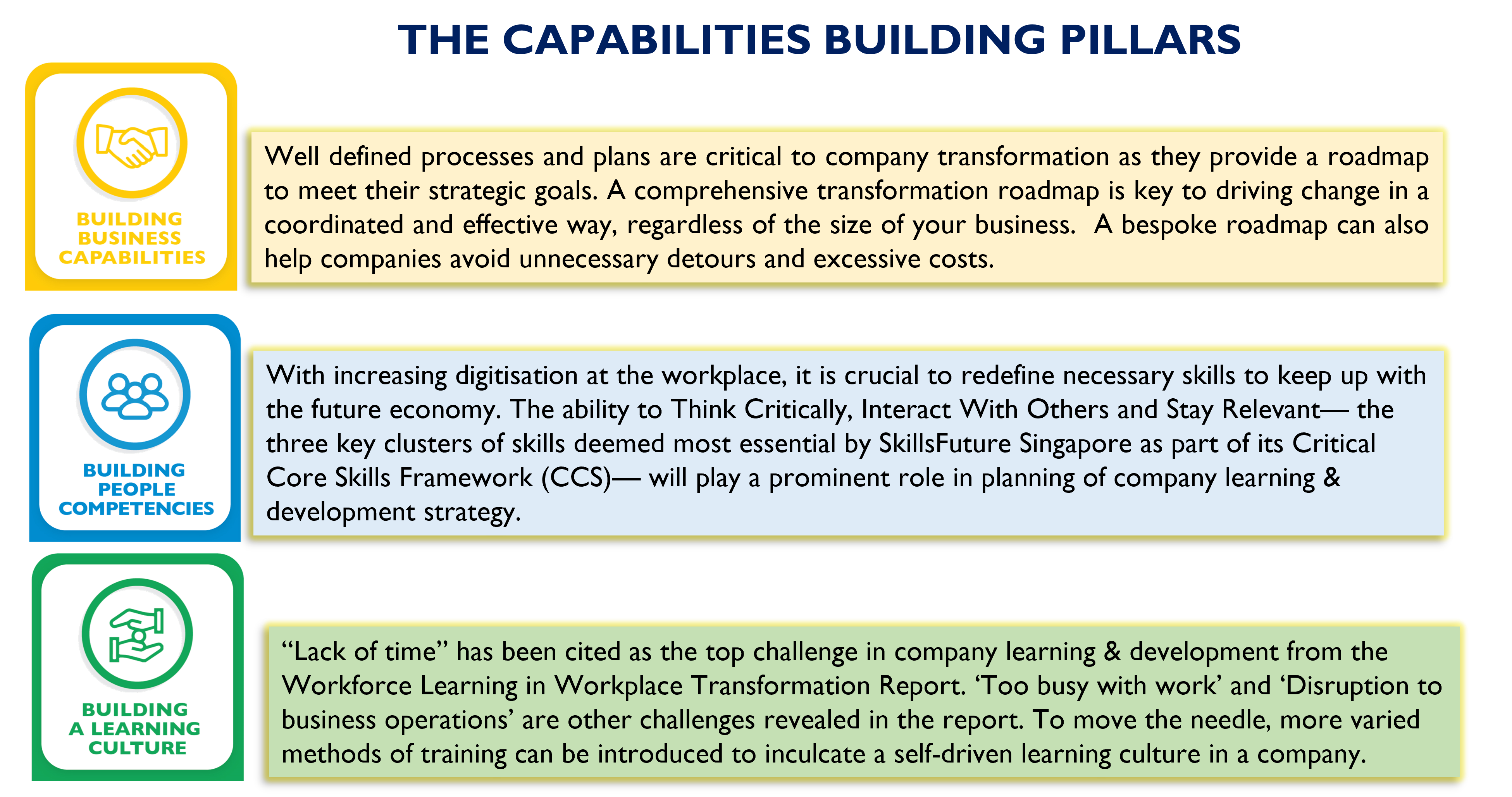NTUC LHUB Corporate Training Prospectus 2022
Training Prospectus 2022

Navigating an endemic COVID-19 world to excel in today’s business landscape requires a new perspective toward transformation. A perspective that is outside-in to create a situational centric synergy between the dynamics of the macro environment and the 3 key pillars within an organisation:
Building Business Capabilities, Building People Competencies and Building a Learning Culture.
Download our Training Prospectus 2022 here.
To build business capabilities and unlock their full potential, companies first need to strategise and chart detailed transformation roadmaps.
Roadmap assessments can help companies to effectively identify potential areas for improvement and key drivers for business wins. These assessments include:
- STRATEGIC DIAGNOSIS
Assess macro-environment factors and carry out internal diagnosis on the current state of organisation, including processes, policies, management practices, system, company mindset and behaviours as well as capabilities, to match strategic long-term goals with the company’s improvement potential.
Learn More About This Solution: Operation & Technology Roadmap (OTR)
- GOVERNANCE AND COMPLIANCE FRAMEWORK
Ensure robust internal processes by keeping up with mandatory business policies, structures, and fundamental compliance knowledge.
Learn More About These Solutions: Cybersecurity, Total Workplace Safety and Health, Human Resource Excellence, PDPA, Progressive Wage Model For Security, Environmental Cleaning Sector
- WORKFORCE ENABLING PROGRAMMES
Enhance functional capabilities and transformation skills by tapping on established frameworks for workplace learning and workforce development.
Learn More About These Solutions: Digital Reboot, Workplace Learning Blueprint Development, L&D-as-a-Service (LaaS)
As globalisation and varied modes of working changes the labour market and the skills needed for workers to succeed, individuals need to uplift their personal competencies to differentiate themselves: creativity, responsibility, and problem-solving skills
Soft skills, in particular, have become essential to individuals’ and companies’ success. According to the SkillsFuture Critical Core Skills framework, these are the 3 key clusters of 16 soft skills:
- THINKING CRITICALLY
This cluster sums up the cognitive skills needed for broad and creative thinking. These skills help individuals to make inductive and deductive reasoning, correct analysis, inferences, and evaluations. They are the bridge to finding solutions to complex problems.
These skills include:
- Creative Thinking: This considers and connects multiple ideas and information to form solutions or develop new ways of working. Human-centered approach such as Design Thinking is a proven way to champion innovation and creativity.
- Decision Making: This involves the process of implementing a structured decision or course of action from multiple sources of information. Critical thinking and analytic skills help in analysing risks, possibilities and determining the ideal solution that aligns with the organisation's goals.
- Problem Solving: This refers to the ability to handle difficult or unexpected situations by generating effective and efficient solutions. Problem identification and team collaboration are vital skills to evaluate and capitalise issues into opportunities.
- Sense-Making: This interprets and analyses information to identify or recognise patterns and opportunities. This includes making sense out of big data and information to form actionable insights and conclusions.
- Transdisciplinary Thinking: This applies concepts from multiple disciplines to supplement their knowledge to make decisions and solve problems. Transdisciplinary Thinking allows individuals to establish connections and synthesise information extracted from different disciplines to develop new insights.
- INTERACTING WITH OTHERS
The ‘Interacting with Others’ cluster is tied closely to people relations. Learning from other individuals is one of the most effective ways to acquire new skills and ideas. It includes creating synergies with others, building open communications, being sensitive towards differences in diversity, and building relationships with internal as well as external stakeholders.
These skills include:
- Building Inclusivity: This represents the skill to manage relationships across diverse groups within an organisation. Individuals with this skill are sensitive towards the differences in diversity dimensions and perspectives. This skill allows you to turn diversity challenges into opportunities and identify useful methods to heighten team cohesion.
- Collaboration: This creates synergies with others and builds effective relationships across the organisation. Collaboration skills such as Project Management enhances team management and often create win-win outcomes to achieve business goals.
- Communication: This encompasses the art of conveying and exchanging information effectively and clearly. This skill requires different communication techniques and tools to suit various communication styles.
- Customer Orientation: This is the ability to build relationships with customers, both internal and external, to anticipate their needs and solicit feedback to deliver an effective customer experience.
- Developing People: This demonstrates a leadership quality that seeks to empower themselves and others to learn, and develop their strengths to enhance performance. People with this skill take delight in coaching and supporting co-workers to foster a conducive environment of enablement.
- Influence: This comes from the ability to demonstrate empathy and communicate well. These individuals tend to have high emotional intelligence. They are able to build effective relationships with people and influence behaviours, beliefs or attitudes to achieve desired outcomes.
- STAYING RELEVANT
This cluster is all about effective self-management and staying on top of trends. The skills needed are tied closely to trends impacting work and living that provide strategies, direction, and motivation for technical skill development.
These skills include:
- Adaptability: This is the ability to exercise flexibility in behaviours or approaches to respond to changes. Stemmed from a level of self-awareness, adaptable individuals typically respond well in the face of uncertainty.
- Digital Fluency: This is knowing how to use the right digital tools, technology and software across work processes and activities to problem solve, drive efficiency and make information sharing easy.
- Global Perspective: This demonstrates an awareness and understanding of global challenges and opportunities. It is the ability to identify barriers to workplace diversity and inclusion and work well in a cross-cultural environment.
- Self Management: This Is about taking ownership of one’s effectiveness, personal brand and well-being. Individuals who can self manage exercise a high level of self-awareness and practise self-care. They are able to identify red flags such as potential workload, stress triggers and mitigate such situations.
- Learning Agility: This has to do with continuous learning. People with learning agility are able to deploy different learning approaches to facilitate continuous career development.
Learn More about most of these essential soft skills from Hybrid Workplace Bundle
The evolving Healthcare Industry landscape also requires one to be sufficiently equipped with various Adaptive skills to stay relevant.
Find Out More About Healthcare Academy here.
Reference from SkillsFuture Critical Core Skills framework
It is becoming increasingly essential for organisations to embed a culture of learning as part of their internal value support system to encourage employees’ personal and professional growth.
A learning culture in a corporate environment is one that supports continuous learning. Such an environment catalyses innovation, prioritises knowledge acquisition, and drives the application of this knowledge to achieve company-wide goals. In recent times, cultivating a learning culture has become integral to maximising workforce potential and increasing productivity. With time as a major challenge to learning, it is important to explore varied methods of upskilling to facilitate building a learning culture.
- SELF-DRIVEN LEARNING
Self-driven learning is a revolutionary shift away from the traditional classroom-based learning. Its most distinctive feature is the flexibility and freedom it affords
learners to plan and structure their learning journey. Learners are empowered to step up and take charge of their own development.
Learn More About This Solution: LHUB Learning eXperience Platform (LXP)

